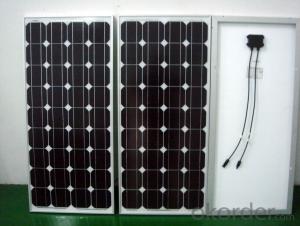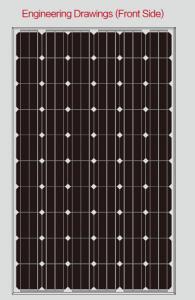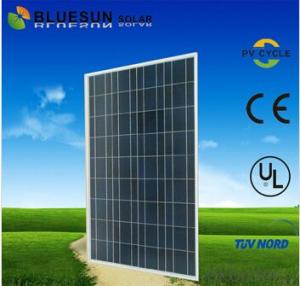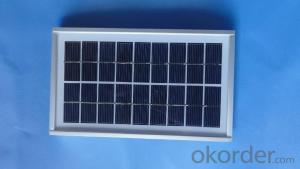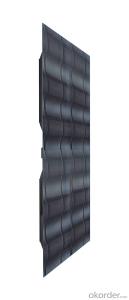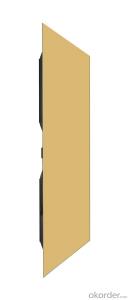130W/135W Solar Panel with TUV IEC MCS CEC IDCOL SONCAP Certificates
- Loading Port:
- Shanghai
- Payment Terms:
- TT OR LC
- Min Order Qty:
- 1000 watt
- Supply Capability:
- 100000000 watt/month
OKorder Service Pledge
OKorder Financial Service
You Might Also Like
- TUV IEC, MCS (UK), CE, CEC (Australia), INMETRO, IDCOL, SONCAP CERTIFIED
- [EU ANTIDUMPING DUTY-FREE]
- PROFESSIONAL SOLAR PANEL MANUFACTURER SINCE 2004
FEATURES
`Long Service Life
`High Efficency Solar Cells
`Special Aluminum Frame Design
`High Transmission,Low Iron Tempered Glass
`Advanced Cell Encapsulation
APPLICATIONS
`Solar power stations
`Rural electrification, Small home power systems
`Power supply for traffic, security, gas industry
`12V and 24V battery charging system
`Other industrial and commercial applications
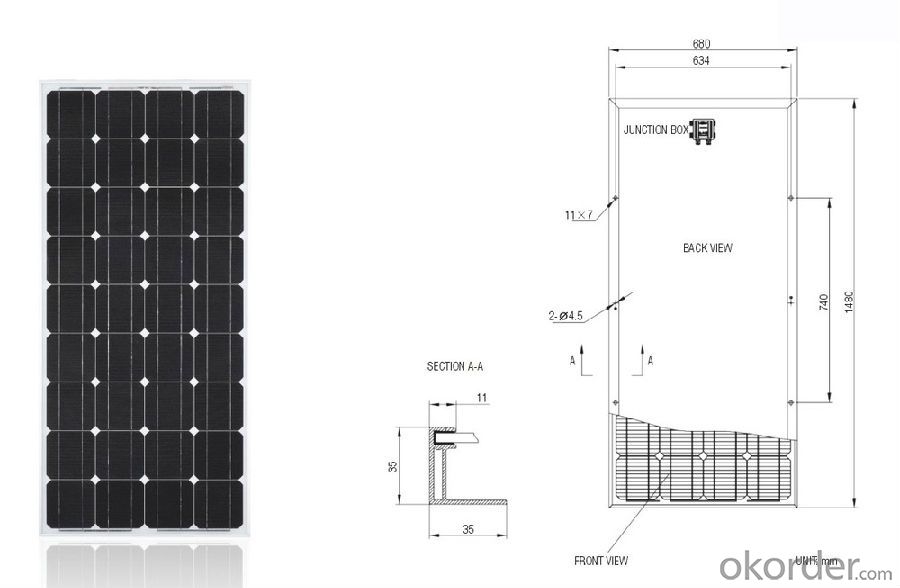
ELECTRICAL CHARACTERISTICS | ||||||
Model Number | KM130(6) | KM135(6) | KM140(6) | KM145(6) | KM150(6) | |
Maximum Power as per STC | Pmax(W) | 130 | 135 | 140 | 145 | 150 |
Power Tolerance | % | ±3% | ||||
Maximum Power Voltage | Vm(V) | 17.96 | 18.14 | 18.36 | 18.15 | 18.28 |
Maximum Power Current | Im(A) | 7.26 | 7.45 | 7.65 | 7.99 | 8.21 |
Open Circuit Voltage | Voc(V) | 21.6 | 21.74 | 21.96 | 21.72 | 21.9 |
Short Circuit Current | Isc(A) | 7.83 | 8.04 | 8.17 | 8.69 | 8.93 |
Maximum System Voltage | VDC | 1000 | ||||
Cell Efficiency | % | 15.0 | 15.5 | 16.1 | 16.7 | 17.3 |
Module Efficiency | % | 12.9 | 13.4 | 13.9 | 14.4 | 14.9 |
Cells per Module | Pcs | 36 | ||||
Cell Type | Monocrystalline silicon | |||||
Cell Size | mm | 156 x 156 | ||||
Bypass Diodes | Pcs | 10Amp, 2 pcs | ||||
Max. Series Fuse Rating | A | 10A | ||||
Temperature coefficient of Isc | %/°C | 0.05 | ||||
Temperature coefficient of Voc | %/°C | -0.35 | ||||
Temperature coefficient of power | %/°C | -0.47 | ||||
NOCT- Nominal operating cell temperature | °C | 47 ± 2 | ||||
Operating Temperature | °C | -40 ~ +85 | ||||
MECHANICAL CHARACTERISTICS | ||||||
Dimensions | mm | 1480 x 680 x 35 | ||||
Weight | Kg | 11.6 | ||||
Type of Junction Box | TUV certified, IP65 | |||||
Cable Type, Diameter | - | |||||
Connector | - | |||||
Tempered Glass | 3.2 mm, high transmission, low iron | |||||
Packing
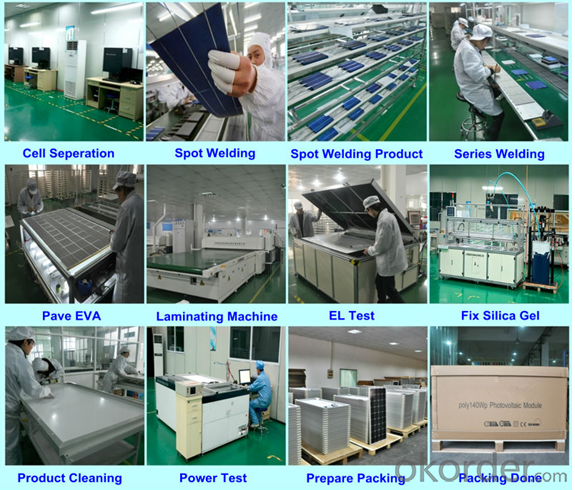
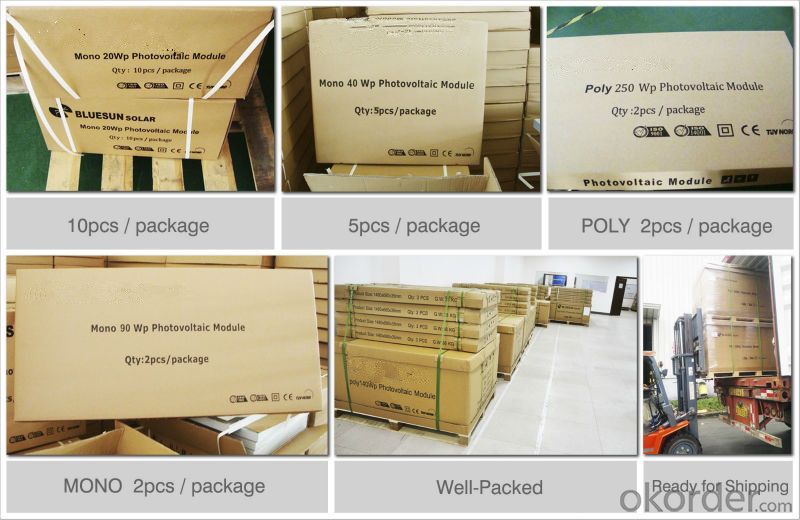
FAQ
1. What kind of Solar Cells does it have
---poly crystalline 156*156mm and 125*125mm or mono 125*125mm and 156*156mm
2. Is the front panel Glass or Plastic
---Tempered glass 3.2mm thickness or adjust to what you need, Light transmittance up to 95%.
3. Does it meet Europe Standards for Solar Energy
---This is TUV approval products, all the producing procedure apply TUV&UL.
4. What is the Efficiency level
--- Between 16-18.9% for solar cells.
5. What is the Nominal Voltage
--- 18v 20v 24v 36v 30v 48v , and so on, we can adjust to what you need.
6. What is the Warranty Period, How many years?
Power efficiency warranty:
---90% in 10 years; 80% in 25 years.
- Q:I have the wattage of solar panel but i dont know about the voltage amp; current rating of it. Plz explain me about the voltage rating of solar panel.
- The voltage rating and current rating are part of the specifications for the panel. You will have them listed on the spec sheet. The voltage number is usually the open circuit voltage of the panel, the voltage with no load. The current number is the short circuit current of the panel. In use, you need special electronics, called a Maximum Power Tracker (MPT) controller, which adjust the load to get the most power from the panel, and adjust the voltage output via a DC-DC converter to the optimal conditions to charge the attached battery. how to take batteries as per solar wattage ? sorry, don't understand this.
- Q:Can solar panels be damaged by birds or rodents?
- Yes, solar panels can be damaged by birds and rodents. Birds may nest, perch, or peck at the panels, causing cracks or scratches on the surface. Rodents, on the other hand, can chew through the wiring or insulation, leading to electrical issues. Regular maintenance and bird deterrents can help minimize the risk of damage.
- Q:Are solar panels recyclable?
- Yes, solar panels are recyclable.
- Q:hi everyone..i wanna do my major project on solar panels...so anyone kindly tell me the projects based on solar panels..
- I have done this in my project too and a solar panel, two wires, a circuit/project board, an LED light/a small fan,a switch and a solderer. Just solder the wires to the positive and negative parts of the panel, put the wires connected to the panel to the board put the LED's on the other side and the switch together with it shine light on the panel and the light/fan will work.(If it dosen't work, please DO NOT consult ME.)
- Q:What is the impact of dust and dirt on solar panels' efficiency?
- Dust and dirt on solar panels can significantly reduce their efficiency. When these particles accumulate on the surface of the panels, they block sunlight from reaching the photovoltaic cells, resulting in decreased energy production. Regular cleaning and maintenance of solar panels are crucial to ensure optimal performance and maximize their power output.
- Q:Properties of solar panel?I know this is too general,but i am to write a report on the materials used to make solar panels,and i am to include the physical, mechanical ,and chemical properties of the materials.It's just too general,such that i am lost.There are so many types of solar panels.So i hope some experts on this subject can give me a general guide lines ,maybe the tensile strength ?as much as you can please.
- Properties Of Solar Energy
- Q:How much energy can a solar panel produce in a day?
- The amount of energy a solar panel can produce in a day depends on various factors such as the size and efficiency of the panel, geographic location, weather conditions, and orientation towards the sun. On average, a standard solar panel can generate between 4 to 6 kilowatt-hours (kWh) of electricity per day. However, this can vary significantly and may be higher or lower depending on the aforementioned factors.
- Q:Hi. I need to build a solar panel for a project. it should be able to light a 60 watt light bulb. also, it should be about 3x3 ft if it is 50% efficient. if anyone knows any websites or can help me, please answer! thanks.
- Making your own photovoltaic (solar electric) panel is a nontrivial matter if you want to get 60 watts out of it. If this is a science fair project, there are some possible paths that I'd suggest: ) Make your own cupric oxide panel. With just one square foot, you can harvest perhaps 0.5 mW in bright sun - enough to power a solar calculator; -or- 2) Buy a panel to light your 60 watt bulb. You could probably get away with a panel that is 6 square feet, but would use a car headlight as the lamp. If you wanted to light a regular household bulb, you would need electronics to step up the voltage, and you would lose a sizeable fraction of the energy just in the conversion. -or- 3) Buy broken solar cell pieces, or individual solar cells, and solder them together into your own panel. This is a LOT of trouble, and is a finicky process to get working and keep working. And it may not end up being cheaper than buying a ready-made panel. But you can claim that you made it! By the way, crystalline silicon panels are in the ballpark of 5% efficient, and a 3' x 3' one would produce in the neighborhood of 20 watts.
- Q:Are you a Solar Panel Specialist/Genius/Enthusiast?
- No, just an amateur. I guess that could be called an Enthusiast. I think most people find the topic somewhat interesting, some more than others. Why do you ask?
- Q:all i want to do is provide enough electricity for 2 fluorescent bulbs i was looking at some 80 watt panels how many of those would i need and what else do i need for storing the electricity for use at nite? and how much would it all cost?
- The solar panels are made in China because there are fewer environmental regulations and cheap coal power. It takes a lot of energy to melt silicon and there are toxic waste products. It would be three to five times more expensive to make the panels in the US ( three times is just for reprocessing the toxic wastes ). Solar cell made in China are about $2 a watt, perhaps as low as $ a watt but in truth the claims for $ a watt or less solar panels as in thin film solar panels have much lower efficiency and require perhaps ten times more surface area.
1. Manufacturer Overview |
|
|---|---|
| Location | |
| Year Established | |
| Annual Output Value | |
| Main Markets | |
| Company Certifications | |
2. Manufacturer Certificates |
|
|---|---|
| a) Certification Name | |
| Range | |
| Reference | |
| Validity Period | |
3. Manufacturer Capability |
|
|---|---|
| a)Trade Capacity | |
| Nearest Port | |
| Export Percentage | |
| No.of Employees in Trade Department | |
| Language Spoken: | |
| b)Factory Information | |
| Factory Size: | |
| No. of Production Lines | |
| Contract Manufacturing | |
| Product Price Range | |
Send your message to us
130W/135W Solar Panel with TUV IEC MCS CEC IDCOL SONCAP Certificates
- Loading Port:
- Shanghai
- Payment Terms:
- TT OR LC
- Min Order Qty:
- 1000 watt
- Supply Capability:
- 100000000 watt/month
OKorder Service Pledge
OKorder Financial Service
Similar products
New products
Hot products
